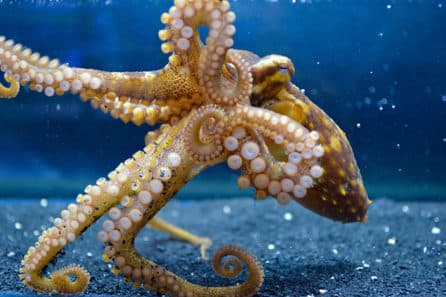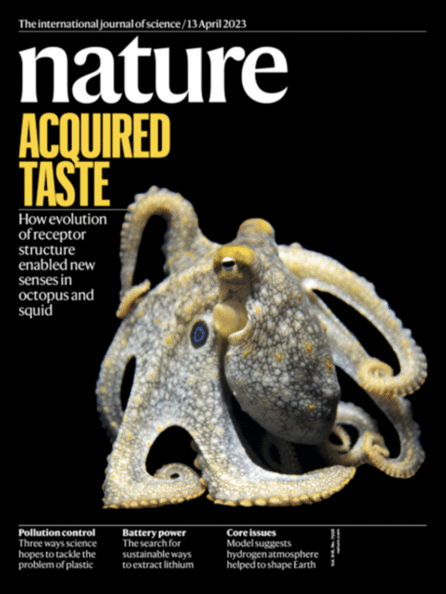How Octopuses and Squids Acquired New Senses
The Context: Octopus and squid tentacles are home to a complex nervous system that lets them sense their external...The Context: Octopus and squid tentacles are home to a complex nervous system that lets them sense their external environments, even being able to taste what they touch. But how they have evolved their special seafloor sensing skills – and whether humans have similar sensory mechanisms – has remained unclear.
The Study: In two studies published in Nature, scientists led by NYSCF – Robertson Neuroscience Investigator Nicholas Bellono, PhD, of Harvard University have discovered clues as to how octopuses and squids have evolved to ‘taste what they touch.’
The Importance: These studies uncover clues as to how these specialized sensory abilities evolved in cephalopods and their relationship to human brain receptors, helping to understand how new sensory abilities and behaviors arise in evolution across all species.
Octopuses and squids are special residents of the deep blue who have evolved past their mollusk cousins to develop twisty tentacles that can sense the world around them. How did they leave their snail and slug associates behind to become more complex sensory beings? And could humans have evolved in a similar way? Dr. Bellono’s team, in collaboration with the lab of Ryan Hibbs, PhD, at the University of San Diego took a closer look to find out.
A Look Inside Octopus Arms
Dr. Bellono’s lab has previously researched octopus’ unique ability to taste what they touch.
“They use their arms for ‘taste by touch’ contact-dependent aquatic exploration of crevices in the sea floor,” he noted in an article from The Harvard Gazette.

The team took a closer look at the cellular tools that let them carry out this feat, focusing on chemotactile receptors on cells found in octopus tentacles.
They found that these chemotactile receptors evolved from acetylcholine neurotransmitter receptors, the same kind that humans have where our nerves meet our muscles. The difference, however, is that in octopuses, these receptors sense greasy molecules found on the surfaces of seafloor residents, rather than the neurotransmitters humans use to tell a muscle to move.
A side-by-side comparison of chemotactile receptors and acetylcholine receptors illuminated one stark difference.
“The binding pocket [the sticky, chemical-receiving part] of the octopus receptor, although in a similar spot that the ancestral neurotransmitter sticks to, is very different,” said Dr. Bellono. “And we discovered that the binding pocket is under evolutionary selective pressure.”
Essentially, the evolution of octopuses altered their sensory cells to make an efficient transition from neurotransmission to environmental chemosensation (tasting what they touch).
Squid Square Up
Squid are a bit more aggressive than octopuses. Rather than rambling around touching their surroundings, they lurk in the shadows and then ambush their prey.
“In the second paper, we found that the squid’s chemical receptors are more analogous to our sense of taste,” remarked Dr. Bellono.
Squid tentacles are finely tuned to sense bitter molecules. If they catch their dinner and ‘taste’ that bitterness, they’ll let it go. Comparing squid receptors to humans and octopuses highlighted a difference in the binding pocket.
“In this case, there were fewer receptors than in the octopus, and they looked more like the neurotransmitter binding pocket in that it can bind more hydrophilic molecules,” said Dr. Bellono. “We see this difference between the octopus and squid as reflecting an evolutionary timeline and adaptation, where we see transition from neurotransmission in acetylcholine receptors to soluble bitter taste in the squid, to the most recent innovation of taste-by-touch sensing of insoluble molecules in octopus.”
Evolutionary Clues

Altogether, these studies paint a clearer picture of how cephalopods evolved their nervous system, and are important groundwork for understanding how the same happened in humans.
“Cephalopods are excellent models for studying evolution. These studies present a nice and unexpected example of how to exploit these creatures to study biological innovation from atomic to organismal levels,” remarked Dr. Bellono.
Read more about Dr. Bellono’s work in a profile from The Harvard Gazette.
Learn more about this research from UC San Diego Today.
Journal Articles:
Structural basis of sensory receptor evolution in octopus
Corey A. H. Allard, Guipeun Kang, Jeong Joo Kim, Wendy A. Valencia-Montoya, Ryan E. Hibbs & Nicholas W. Bellono. Nature. 2023. DOI: https://doi.org/10.1038/s41586-023-05822-1
Sensory specializations drive octopus and squid behaviour
Guipeun Kang, Corey A. H. Allard, Wendy A. Valencia-Montoya, Lena van Giesen, Jeong Joo Kim, Peter B. Kilian, Xiaochen Bai, Nicholas W. Bellono & Ryan E. Hibbs. Nature. 2023. DOI: https://doi.org/10.1038/s41586-023-05808-z

